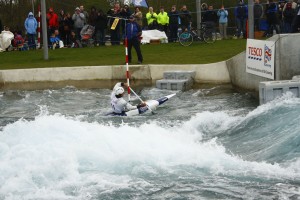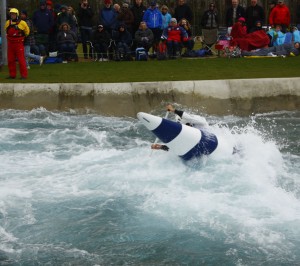The selection trials for the British, US, and Czech Olympic teams all took place this weekend. I’ve been down to Lea Valley to watch the second and third day of racing for GB selection– although it was essentially game-over after the second race. Three wins in a row for Dave Florence (C1), Rich Hounslow (K1) and Lizzie Neaves (LK1) showed their nomination to the British Olympics team was no fluke, while Ettiene Stott and Tim Bailey showed real class in C2. Leaving aside any personal feelings for those who missed out, this is a dream outcome because it means two British C2 crews. Is this the strongest GB slalom team yet?
So fantastic news for these five paddlers, whose performances give them a well deserved, once in a lifetime chance to compete at a home Olympics. But I did start thinking about the many great paddlers, both here in Britain and elsewhere, who failed to make their Olympic team. For some it will be a temporary setback, and they will be able to look ahead to future opportunities. But for others this disappointment will prompt thoughts of retirement – particularly those who were ‘hanging on’ for a final shot at the Olympics.
I don’t think retirement is ever an easy choice for a committed athlete, especially when there are nagging doubts about whether they could still achieve more. In my case retirement was a prolonged process. Disappointed after the 87 Worlds, I took a year out from slalom and focused on my University studies, wave-ski surfing and learning to sailboard. It also took the financial pressure off for a while – paying for a multi-week trip to Europe each year wasn’t easy and I was pretty much broke. But in the back of my mind was a sense of unfinished business. In 1989 team selection took place in Tasmania, so I dusted off my slalom boat. To everyone’s surprise (including mine) I made the team for the Savage River worlds. It was a swansong for me, and while it was great to do another season of international races, in my heart I wasn’t as hungry or committed as I had been before. I’d tasted a life beyond slalom, and was increasingly clear about the direction I wanted my career to take. I kept on training and racing domestically in a sort of twilight zone, caught between a nagging sense of dissatisfaction, but without the financial or emotional wherewithal to re-focus 100% on slalom. By 1991 I had finished my psychology degree and started coaching.
In stark contrast consider the example of Oliver Fix. An immensely talented paddler, Oli retired somewhat unexpectedly after winning the Worlds in 95 and the Olympics in 96. He said he had achieved what he wanted to and was ready to do something different – in his case travelling and studying in China before moving successfully into coaching.
So clearly one factor is the degree of success a paddler achieves and how satisfied they feel with their career. It’s hard to time retirement as sharply as Oli did, and I expect many go on a year or two beyond their best. Another reason is that one’s sense of identity can get so tightly bound up with being an athlete. This speaks to a deeper question of self-esteem, and the journey everyone faces to grow truly ‘comfortable in their own skin’, confident in who they are not what they do. Even for a mediocre international career like mine, it made me feel special to be a member of a national team, to travel and compete internationally. Leaving this behind for a ‘normal’ life can feel like an anti-climax or in extreme cases, even bring a sense of failure. Perhaps this is one of the attractions that keep many ex-paddlers involved in the sport as coaches (or sport psychologists!).
Yet I also know paddlers who retired and quite happily never looked at a boat again. I think that for these, slalom was a means to an end rather than a passion in itself. Their motivation was to pursue goals and test themselves against the best – it just happened to be in a kayak.
My heart goes out to those disappointed paddlers who will be spending the next few days contemplating a future as something other than a top-level competitor. It will be a period of soul-searching and reflection – I would certainly counsel against a snap decision. But rest assured that there is a life beyond racing, and that the resilience, determination and courage that are developed as a competitor are valuable qualities for ‘normal’ life. Retirement opens up new possibilities too, opportunities to develop different qualities and skills that are often put to one side in the single-minded pursuit of excellence. Most importantly, remember that the simple joy of paddling whitewater can remain available for a long time. If in any doubt, check out these photos of the 1972 British Olympic team paddling together at Lea Valley. Not bad at all 40 years on! See the photos here http://aephotos.co.uk/slalommediaday4apr2012-team1972




